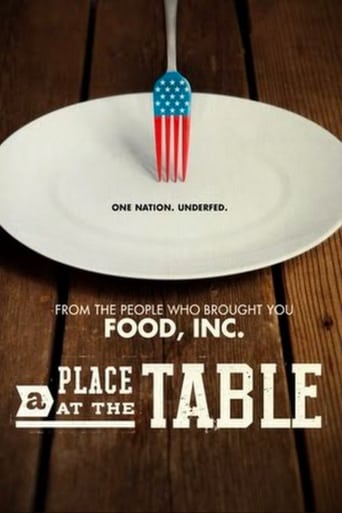aspenflyer2
Excellent show. An eye opening documentary about the short falls of our ability to provide adequate nutrition for some our most needy members of society. If we all would take a close look, not just at own lives but our friends , family or even our neighbors, we may find how rampant this problem is. Our school lunch program is not perfect and it needs some help. The only way it's going to get help is by people who are willing to fight and do what needs to be done. What if we were to minimize the administration cost, the labor cost and put more money to the cost of a nutritious complete meal. Work as a collective group to end this problem. Please volunteer, make a difference in the lives of our children, give what can be given, care for the well being of the children and our future generations.
ivar-oines-577-27896
This documentary should be seen by everyone who think that the economic system in the US is a perfect one. It also shows how much the people that actually generates wealth are exploited, just for the record bankers, financiers and the stock-market don't generate wealth, its the people that make products and services that benefit humankind that generates wealth.This of course comes from a guy that most Americans would consider a communist.It warns about the future problems that the US might face if this type of problem is as prevalent as it depicts( I don't know all the facts behind this film ). If it is accurate then I hope for the people in the US will fix it instead of hope for the stock-market to fix it, it will not do that.
rbsteury
My wife and I downloaded this from iTunes today and were so impacted by the film. The film follows several people of different races and backgrounds, urban to the South to the mountains of Colorado. All are working (as the film goes on) but none make enough to buy enough food to be sure it will last all month. Many of them do not even qualify for food stamps/bridge cards. The fact that the poor and hungry have little lobbying impact in Washington compared to the gigantic agribusiness flood of money is clearly part of the reason we see this dilemma where the richest large nation fails miserably in keeping its working poor feed. Please see this film if you care about this issue. Many of your opinions may turn out to be misconceptions founded on stereotypes.As for Marc Newman's criticism, the idea that charity organizations like food kitchens and food banks sponsored by churches (yes, those clips of devoted pastors and churches were kept in and were very impressive) could solve this problem is ludicrous. We are talking about 50 million people and 13 million children. As my pastor (who is VERY conservative) says... the problem is overwhelming. There is no way volunteer and charitable organizations can meet the demand, and for Mr. Newman to suggest it could makes me wonder if he has ever worked at trying to get food to the poor. Many of us have done so and we know how huge this problem is... far beyond the resources of the faith community. As was noted in this documentary, the government once before almost totally eliminated hunger (in the late 70's) when both Democrats and Republicans (including Ronald Reagan) made it a priority. The government could do it again if it desired.
Marc Newman
I saw A Place at the Table when it was at Sundance in 2012 and going under the title Finding North. I think that the filmmakers are well-intentioned, but the argument presented in this film is plainly absurd. During the Q and A after the film, the director was asked by an audience member if he was correctly stating her position, that the source of the problem of "food insecurity" was Washington's Faustian bargain with big agriculture, and she replied that it was. Then came the follow-up question: "Why in the world would you trust for solving this problem the very people responsible for causing it?" The audience -- do remember that this is Sundance, not known as a bastion of conservatism -- burst into applause. The only organization that seem to really be making a difference in the film was a private church with an extensive food outreach program. Don't be misled. The problem this film addresses is not starvation, or even hunger, it is what they term "food insecurity." No one in the film deals with the true source of the problem, which is the breakdown in the family, and the replacement of parental responsibility with government subsidy, which cyclically feeds the breakdown of families. Kudos to the filmmakers for highlighting the involvement of that local church -- I hope it made it into this final version of the film -- because if more churches were involved in the lives of the hurting people in their communities, they could provide a whole lot more than anonymous food stamps. They could create community, educate about nutrition, and give people benefiting ownership of the program so that they no longer had to feel dependent all the time. The film will tug at your heart -- just don't forget to engage your brain.


